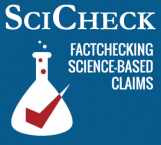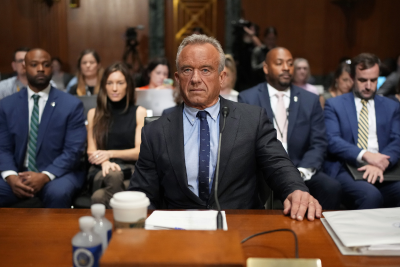Heated exchanges between some senators and Health and Human Services Secretary Robert F. Kennedy Jr. during a Sept. 4 hearing amplified confusion about the availability of COVID-19 vaccinations for the fall, with Kennedy misleadingly claiming that “anybody” can still get a vaccine. HHS policies have created roadblocks to vaccine access.

The full extent of vaccine availability won’t be clear until at least Sept. 18, when the Centers for Disease Control and Prevention’s Advisory Committee on Immunization Practices is expected to meet to discuss its COVID-19 vaccine recommendations. Kennedy dismissed the entire committee over the summer and has since installed some new members, several of whom have a history of spreading false or misleading claims about vaccines.
But changes to vaccine policy thus far mean that unlike in past years, many people may need to get a prescription to get a vaccine and more may also need to pay out of pocket for the shot. They may also not be able to go to a pharmacy to get vaccinated in some places.
On Aug. 27, the Food and Drug Administration approved four COVID-19 vaccines for the upcoming season — Nuvaxovid from Novavax, Comirnaty from Pfizer/BioNTech, and Spikevax and mNEXSPIKE from Moderna. But in each case, the approval is limited to those 65 years old and over or those who have at least one underlying health condition.
In previous years, there had been no such limitations. As we’ve explained before, the FDA typically handles the licensing of vaccines and gives general indications for their use, while ACIP advises the CDC on who should get vaccinated and how often. This year’s shots have been updated to target JN.1 or LP.8.1 omicron subvariants that have recently been in circulation.
Senators from both parties at the hearing said that some people wouldn’t be able to get the vaccine due to the FDA’s new restrictions. Kennedy, however, said that anyone who wants the vaccine can get it.
In one exchange, Sen. Elizabeth Warren, a Democrat from Massachusetts, asked Kennedy, “Will you tell America that all adults and all children over six months of age are eligible to get a COVID booster at their local pharmacy today?”
“Anybody can get the booster,” Kennedy replied, although he later appeared to concede that may not be the case in some states. “It depends on the states,” he said, still adding, “everybody can get it.”
In another exchange, Sen. Bill Cassidy, a Republican from Louisiana, read into the record letters he’d received about difficulty with COVID-19 vaccine access and concluded, “I would say, effectively, we’re denying people vaccines.”
“I think you’re wrong,” Kennedy said.
“HHS is not limiting access to the COVID vaccine,” a department spokeswoman told us in an email when we asked for evidence to support Kennedy’s statement. “The COVID vaccine remains available for anyone who chooses it in consultation with their healthcare provider.” She pointed us to a post on X from the White House that included a clip of FDA Commissioner Marty Makary saying, “remember, 20% of medications in the United States are given off-label.”
It’s true that a widely cited 2006 paper found that 21% of prescriptions for commonly prescribed medicines were written for uses not included in the drug’s FDA approved label, a practice referred to as off-label usage.
But while it’s relatively common for people to receive drugs for off-label use, “our vaccine system doesn’t usually function that way,” Jason Schwartz, a professor at the Yale School of Public Health with expertise in vaccine policy, told us in an interview. Off-label use of vaccines is not common, he said, explaining that doctors typically follow CDC recommendations on vaccine administration.

This means that technically, the vaccine should still be available to all if those who are younger than 65 and without risk factors have a doctor willing to prescribe it off-label. But some doctors may be hesitant to do so, as we’ve written.
“Physicians can still provide COVID vaccines off-label,” Dr. Tina Tan, president of the Infectious Diseases Society of America, said in an Aug. 27 statement. “However, pharmacists’ ability to provide off-label vaccines may be severely constrained, underscoring the vital role of physicians and other clinicians in maintaining access.”
In the past, most people got their COVID-19 shots at pharmacies, according to data from the CDC.
Depending on the state, pharmacists can be “limited to the FDA label and ACIP recommendations,” Dorit Reiss, a professor of law at University of California Law San Francisco who specializes in vaccine law and policy, told us in an email. “Several states have moved to change that, but it’s still not complete in some.”
Some states also require ACIP to sign-off on recommendations before pharmacies can administer the shots without a prescription, even for people who meet the FDA requirements. CVS said in a statement that right now, in nine states plus Washington, D.C., individuals need a prescription to get the vaccine at CVS pharmacies. In the rest of the states, pharmacies can vaccinate without a prescription if individuals self-attest that they meet the FDA criteria, a CVS spokeswoman told us.
Several states have changed or are working to change their rules, including allowing pharmacists to follow recommendations from groups other than federal agencies, such as the American Academy of Pediatrics and the American Academy of Family Physicians. Both of those organizations have reiterated the importance of vaccination following the FDA’s change in policy, with the AAP calling the change “deeply troubling.” The decision to narrow the COVID-19 vaccine approvals was reportedly made by an administration appointee who overruled career staff, according to the New York Times, which quoted from internal FDA memos on the matter.
Some public health experts have referred to the availability of COVID vaccines across the U.S. as a “patchwork,” with different rules in different states. Amid the confusion, people are also having different experiences trying to get vaccinated at pharmacies even within the same state, the Washington Post reported.
Another barrier to access may be cost. Depending on what ACIP decides to recommend at its upcoming meeting, some people may lose COVID-19 vaccine coverage.
“ACIP recommendations determine what private insurers are required to cover — they have to cover what ACIP recommends” — and also determine what Medicaid covers, Reiss said. “Private insurers can still choose to cover things not required, but don’t have to. And Medicaid cannot.”
According to the current price list from the CDC, the cost per dose for an adult COVID-19 vaccine is around $140.
There are “semantics going on here,” Schwartz said of HHS’ position, explaining that the vaccines are technically available, but there are more complexities involved in accessing them for many people — where to get them, who will administer them and how much they will cost — than there were a year ago.
Overall, he said, for people outside of the FDA’s designated group, “these COVID vaccines are harder to access.”
Correction, Sept. 11: The FDA’s COVID-19 vaccine approvals are for those 65 and older, not over the age of 65 as our story originally said. We have corrected the error.
Editor’s note: FactCheck.org does not accept advertising. We rely on grants and individual donations from people like you. Please consider a donation. Credit card donations may be made through our “Donate” page. If you prefer to give by check, send to: FactCheck.org, Annenberg Public Policy Center, P.O. Box 58100, Philadelphia, PA 19102.